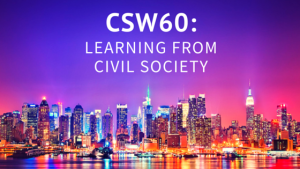By Clara Fisher, Paige Harland, Kat Ilich, and Erin McGown
For two weeks in March, thousands of women and men from every country, culture, and social group imaginable flocked to New York City to take part in the UN’s Commission on the Status of Women. Their common goal: gender equality.
Our George Washington University graduate group was lucky enough to join them to pursue our research on UN Security Council Resolution 1325 and UN Peacekeeping.
In addition to the official talks held at the United Nations, hundreds of NGOs and civil society organizations held side events; our group was able to attend several to recruit participants for our study and learn more about how different NGOs are working on gender issues. While we often spend time discussing how we can achieve gender equality through formal institutions, these events were a reminder of the power of individual women and civil society organizations to make a real change in the world. We had an opportunity to be a part of this change when two of our group members, Erin and Clara, attended Implementing the Women, Peace & Security Agenda: A Roadmap for the 1325 Global Study Recommendations. Resolution 1325 was the first Security Council resolution to push for the inclusion of women in conflict and post-conflict settings. The Global Study is a comprehensive evaluation of the Women, Peace and Security agenda which includes recommendations and was released in 2015 on the 15th anniversary of the adoption of UNSCR 1325.
This event was co-hosted by the Women's International League for Peace and Freedom (WILPF), Madre, CUNY's Sorenson Center and others. Featured speakers included Radhika Coomaraswamy, lead author on the Global Study, and Leymah Gbowee, a Nobel Laureate, who took the room to task for our collective acceptance of the status quo. Leymah brought fire, passion, and motivation in her speech, and encouraged every person in the room to do her or his part for women's rights. She was an activist at her finest and reminded us that dedicated individuals can move the needle on gender equality.
After Leymah's kick in the behind, we split for breakout sessions to discuss the Global Study recommendations in greater depth and produce tandem recommendations to overcome implementation barriers. Our research group has spent much of the last year investigating implementation gaps of 1325, and this was our first chance to engage with civil society on where the gaps are and what needs to be done to fix them. Erin attended the section on financing the Women, Peace and Security (WPS) agenda, while Clara joined the section on protecting women human rights defenders. With Leymah's motivation and her encouragement to seek a paradigm shift, our sessions began.
Erin’s breakout session on financing was particularly inspiring. It was filled with brilliant, strategic women, including WILPF President Madeleine Rees, who solved the WPS financing issues in an hour (or if not solved, at least came close!). The group suggested three key areas: improving local activist resourcing; working at a national level to strategically decide when to validate government action on WPS; and, at an international level, ensuring that funding mechanisms, including the financial institutions, are held accountable. The breakout groups reported back to the larger group later in the afternoon.
Our experience with the WILPF event, particularly with the breakout sessions, underlined the importance of civil society in mobilizing, convening, and holding other actors accountable. Seeing civil society in action, witnessing the passion, the dedication, and the intelligence that filled both the smaller room of Erin’s breakout session, and the larger hall, was inspiring, and confirmed the essential role of women’s participation and civil society engagement.
Civil society can act as the convener, as the enforcer, and as the innovator, particularly when governments and international organizations can't (or won't) enact changes necessary for a more equal world. This is extremely important when it comes to Security Council Resolution 1325, which has been unevenly implemented. Civil society can push the government to do better. Civil society can push to improve the lives of women on the ground. And that's the ultimate purpose of 1325: to improve the lives of women and girls.

